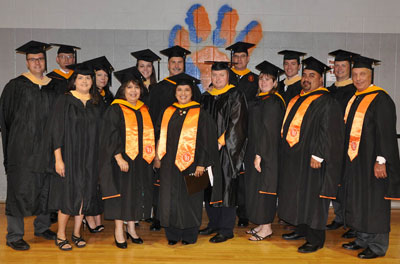First Cohort Of CJ Online Master’s Program Earn Degrees
Aug. 26, 2011
SHSU Media Contact: Beth Kuhles
 |
| Graduates of the new online Master of Science in criminal justice leadership and management program pose before commencement exercises in August. |
After two years of debating, learning and sharing via the computer and Internet, a group of Sam Houston State University students were able to meet face-to-face for the first time when they gathered earlier this month to receive their degrees.
Students in the first cohort of an online master’s degree program offered by the College of Criminal Justice were on campus Aug. 6, to participate in the university’s summer commencement ceremonies.
The graduates, who took the non-traditional route to obtain their degrees, said they enjoyed the flexibility and technological advantages they had by taking their courses online.
“It allowed me to use other resources and to make good friends,” said Bill Livingston, who has been police chief for the Weimar Police Department for 18 years. “It broadened my view of criminal justice.”
Livingston and 19 others graduated with a Master of Science in criminal justice leadership and management, an online program designed specifically for professionals in the field. It is one of three online degree programs offered by the college, which also provides a Master of Science in criminal justice leadership and management for military police as well as a Bachelor of Science in criminal justice degree.
Livingston said he already has used the skills he learned in the program in his department. It helped him during budget preparation and in computer presentations and assisted in developing his portfolio. He also learned the steps he needs to take on employment agreements, and he taught that skill to other law enforcement managers.
Another graduate, Patricia Cantu-Barrios, who serves as a juvenile probation officer in Cameron County, plans to introduce the concept of community probation that she learned in her virtual classroom into the mental health component of her service. With significant budget cuts across the state, the concept represents a movement away from the institutionalization of juvenile probation into a community-based focus, similar to what community policing is doing in getting officers into neighborhoods.
While Barrios can apply what she learned to the probation field, even more importantly, she said, she learned the value of networking with other justice agencies.
“I learned networking is extremely important,” Barrios said. “You have to work together as a unit. You have to know what other people are doing to make the field better. There is a great diversity in jobs in criminal justice and from a juvenile probation officer to police officer, everything comes together to meet in the middle.”
This master’s degree is designed for working professionals, who can complete the program wherever they have access to the Internet. The program is available 24 hours and day, seven days a week and is held in seven-and-a-half week modules so students can complete the degree within two years.
The program offers a wide range of learning opportunities, including lectures, readings, videos and discussion boards. With a variety of criminal justice careers represented, the discussion board became a hot bed of learning. Everyone provided examples from their specific professions, expanding knowledge well beyond the classroom setting, Barrios said.
“I was impressed with the use of the discussion board,” said Jerry Dowling, professor of criminal justice. “I saw a lot more participation than in my face-to-face classes.”
Many students found unique ways to take the courses while holding down jobs. Some set up a computer classroom in their homes, while other downloaded lectures onto thumb drives, listening during their spare time. Many read assignments or listened to lectures during their lunch hours.
One student was taking a mid-term when he wife went into labor with twins; another recovered from cancer surgery while taking his courses.
“It was very challenging,” said Livingston. “It makes you become extremely regimented.”
Without the online program, Barrios said she couldn’t have pursued this degree.
“The online program was an opportunity for me,” she said. “It was demanding. It made me more disciplined and more organized. I am honored to have participated in this program.”
The graduates of the first online cohort include Alain Babin, Margaret Beaty, Catherine Betts, Patricia Cantu-Barrios, Nancy Darnell, James Dixon, Leigh Freeman, William Gollmitzer, John Griffin Jr., Wayne Isbell, Bill Livingston Jr., Erik Reyna, Bobby Smith Jr., Jeffery Spivey, James Summitt, Trevor Taylor, Ricardo Trevino Jr., Jennifer Watkins, Joseph Williams and Brent Wilson.
- END -
This page maintained by SHSU's Communications Office
Director: TBD
Assistant Director: Julia May
Writer: Jennifer Gauntt
Located in the 115 Administration Building
Telephone: 936.294.1836; Fax: 936.294.1834
Please send comments, corrections, news tips to Today@Sam.edu.

 SamWeb
SamWeb My Sam
My Sam E-mail
E-mail

